
|
Back to |
| The Front Page |
| The Game |
|
Golf Croquet fills the bill for Special Olympics athletes |
||||||
|
by Bobbi Shorthouse with Bob Alman Posted December 4, 2011
|
||||||
|
||||||
In its second year at the Ocean House Hotel in Watch Hill, Rhode Island, the competition was fiercer than in 2010, as 13 teams from North Kingstown, Rhode Island, joined the all-day games on the hotel's pristine ocean-side croquet lawn, divided into four miniature courts. The weather was perfect on September 10, and sheer numbers created a fitting spectacle: 33 teams plus coaches and officials on the lawn, and scores of family members and friends of the competitors in the viewing gallery. Add to that a separate competition for 12 "Unity Sports" teams who originated the Connecticut concept of "unified team croquet" and the spectacle approaches Olympic proportions.
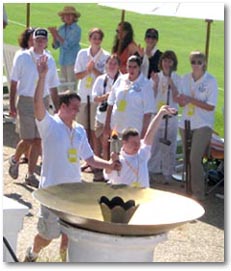
|
| The arrival of the olympic torch--held aloft by athletes--signals the beginning of the event. |
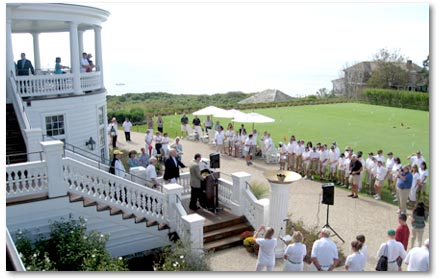
|
| The opening ceremonies MC'd from the steps of the Ocean House add weight and moment to the upcoming competition. |
Unlike the restrained atmosphere of traditional USCA tournaments, here players, coaches and family shout words of encouragement; and officials (aka boardkeepers/referees) are never sitting quietly on the sidelines. Each 20-minute game is assigned its own feet-on-the-court official who stays with the players as they progress through the course, keeping score, immediately answering rules questions and instantly directing the game to an alternate wicket to avoid double-banking congestion.

|
Imagine 40 near-novices playing eight shotgun-start, double-banked simultaneous croquet games in an 80' x 100' space (four 40' x 50' courts) and you can also imagine referees making many instant decisions and redirecting traffic. Lunchtime is not just a quick sandwich. Off the court, competition players relax at a courtside Olympic Village with arts and crafts tables and a smoothie bar. While players take a break, the officials are directing the "Unity Sports" play, for a group of equally competitive teams representing the original players who initiated the concept of unified team croquet as a Special Olympics Connecticut sport. To encourage the unified team concept, Unity Sports games are often played with partners sharing one mallet.
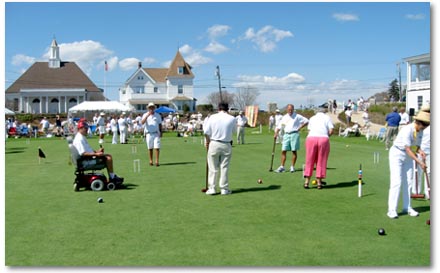
|
| If you can hit a ball with a mallet, you are eligible to compete, and that includes athletes in wheelchairs fitted with extra-broad tires to protect the lawns. |
The "unified team" provides a level playing field for Special Olympics athletes with intellectual disabilities, by giving them non-disabled partners of the same age. As part of a team, during practices the partner and the athlete learn the game together and discover each other's strengths and weaknesses. For example, in unified team croquet an athlete with a severe vision impairment, which would make other sports difficult to play, has a partner to guide the athlete in the correct direction or point out a spot to hit to. And because the games are one wicket at a time and timed at 20 minutes, it isn't necessary to be able to concentrate, stand or walk for a long time. Through the practice sessions, both teammates not only learn about each other's likes, dislikes, similarities and differences, but also how to "unify" their individual strengths and weaknesses to form a skilled team. More often than not they form a solid relationship off the field as well.
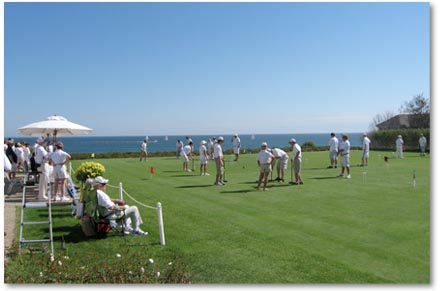
|
The Ocean House, its members and staff, and the businesses and individuals who donated services, equipment and funds are all essential to the success of this ever-growing croquet competition. Volunteers, both on and off the courts, donated countless hours, and for the second year Ocean House croquet pro Teddy Prentis served as Tournament Director and USCA player Bobbi Shorthouse as Technical Advisor.
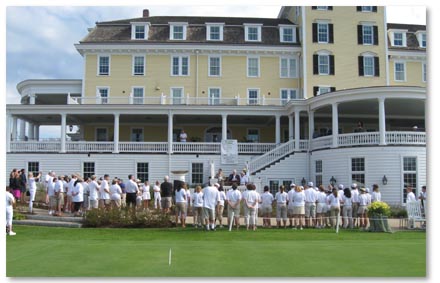
|
This year's court officials included both non-croquet players and USCA members of clubs including Ocean House Mallet Club, Greenwich Croquet Club, Bombay Mallet Club, Elizabeth Park, and Lenox Croquet Club. As the Olympic day ended, more than 100 players, coaches, and family members left with medals, ribbons and craft projects in hand and smiles on their faces. Although tired, even the volunteers and cleanup crew were smiling. Who could ask for a better or more fitting ending to a croquet tournament?
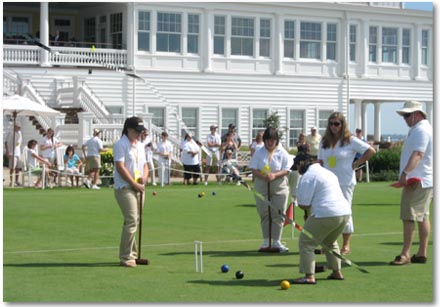
|
Before the day had ended, Ocean House, Beau Doherty, and Denny DeJesus, Connecticut & Rhode Island Presidents, had set a date for 2012. With an increasing number of athletes wanting to play unified team croquet, plans are under discussion for multiple regional pre-Olympics competitions in Connecticut.
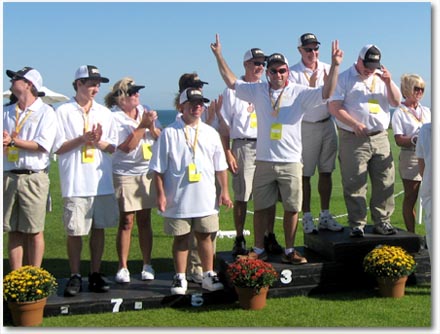
|
| The medals and prizes are awarded in three tiers. |
| Let me win. But if I cannot win, let me be brave in the attempt. - motto of Connecticut Special Olympics |
FOR MORE INFORMATION:
For clarity and simplicity, the Special Olympics Golf Croquet rules have been reduced from 50-odd pages to four. It's a game families or school children can learn quickly and play in their own backyards or the local park. For copies of these special rules or information on volunteering for future Special Olympics croquet events in Connecticut, e-mail Bobbi Shorthouse at CroquetBobbi@gmail.com.